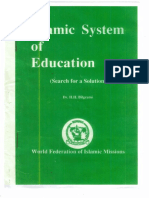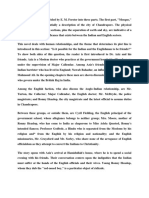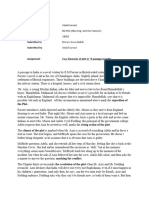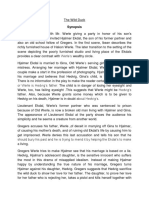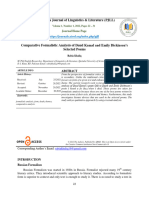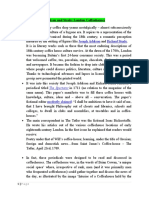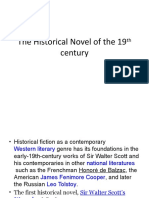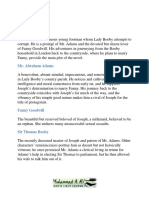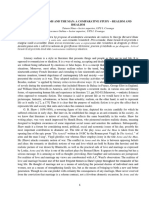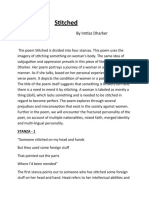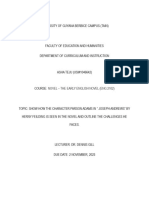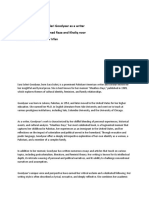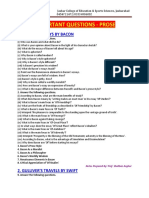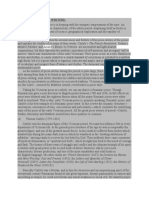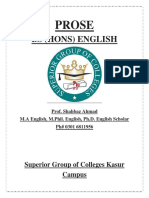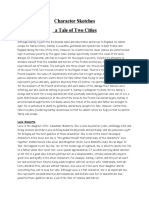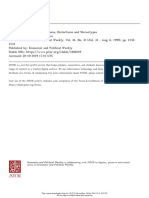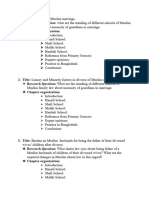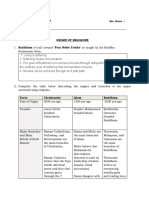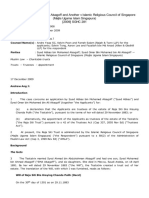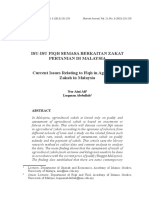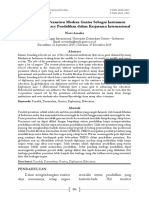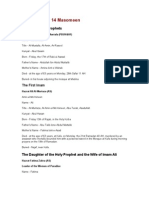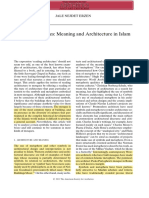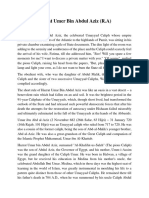APassage To India
APassage To India
Uploaded by
M irfan hashmiCopyright:
Available Formats
APassage To India
APassage To India
Uploaded by
M irfan hashmiOriginal Description:
Original Title
Copyright
Available Formats
Share this document
Did you find this document useful?
Is this content inappropriate?
Copyright:
Available Formats
APassage To India
APassage To India
Uploaded by
M irfan hashmiCopyright:
Available Formats
1
A Passage to India
E. M Foster
Biography of E.M. Forster
Edward Morgan Forster was born in London on the first day of 1879. His father, an
architect from a strict evangelical family, died of consumption soon after Forster
was born, leaving him to be raised by his mother and paternal great-aunt. Because
his mother was from a more liberal and somewhat irresponsible background,
Forster's home life was rather tense. He was raised in the household of Rooksnest,
which inspired Howards End. Forster was educated as a dayboy at the Tonbridge
School, Kent, an experience responsible for a good deal of his later criticism of the
English public school system. He then attended King's College, Cambridge, which
greatly broadened his intellectual interests and provided him with his first
exposure to Mediterranean culture, which counterbalanced the more rigid English
culture in which he was raised.
Forster became a writer shortly after graduating from King's College. His first
novels were products of that particular time -- stories about the changing social
conditions during the decline of Victorianism. However, these earlier works
differed from Forster's contemporaries in their more colloquial style and
established the author's early conviction that men and women should keep in touch
with the land to cultivate their imaginations. He developed this theme in his first
novels, Where Angels Fear to Tread (1905) and The Longest Journey (1907),
followed by the comic novel A Room With a View (1908), which concerns the
experience of a young British woman, Lucy Honeychurch, in Italy.
However, Forster's first major success was Howards End (1910), a novel centered
on the alliance between the liberal Schlegel sisters and Ruth Wilcox, the
proprietor of the titular house, against her husband, Henry Wilcox, an enterprising
businessman. The novel ends with the marriage of Henry Wilcox to Margaret
Facebook Page MA English University of Sargodha Pakistan
2
Schlegel, who brings him back to Howards End, reestablishing the Wilcox land link.
When composing this novel, Forster was part of the Bloomsbury Group, a set of
unconventional British bohemian thinkers that included Virginia Woolf, John
Maynard Keynes, Dora Carrington and Lytton Strachey.
Forster spent three wartime years in Alexandria doing civilian work and visited
India twice. After he returned to England, inspired by his experience in India, he
wrote A Passage to India (1924). The novel examines the British colonial occupation
of India, but rather than developing a political focus, explores the friendship
between an Indian doctor and British schoolmaster during a trial against the
doctor, based on a false charge. A Passage to India is the last novel Forster
published during his lifetime, but two other works remained, the incomplete Arctic
Summer, and the unpublished complete novel Maurice, which was written circa
1914, but published in 1971 after Forster's death. Forster specifically requested
the novel be published only after his death due to its overt homosexual theme.
Although Forster published no novels after A Passage to India, he continued to
write short stories and essays until his death in 1970. He published several
anthologies, including The Celestial Omnibus (1914) and The Eternal Moment
(1928), two collections of short stories, Abinger Harvest (1936), a collection of
poetry, essays and fiction, and several non-fiction works. Forster also wrote the
libretto to the Benjamin Britten opera "Billy Budd." The essays by Forster as well
as his frequent lectures on political topics established his reputation as a liberal
thinker and strong advocate of democracy. Forster was awarded membership in the
Order of Companions of Honor in 1953 and received the Order of Merit from
Queen Elizabeth in 1969. He died in June of 1970 after a series of strokes.
Today, many people know of E.M. Forster due to the many film adaptations of his
work. Titles by Forster that are immortalized not only on the page but also on film
include A Passage to India (1984), A Room with a View (1986), Where Angels Fear
to Tread (1991), and Howards End (1991). It is ironic that so many of his titles
were made into movies, many with great success, as throughout his life he
remained adamant about the difficulty of adapting books to stage or film. In 1919,
Facebook Page MA English University of Sargodha Pakistan
3
he contributed regularly to the London literary magazine "The Athenaeum", often
criticizing various attempts to convert written work to the stage. For him, the
individual experience of reading a book was something that could not be captured
in another form of media. Despite his beliefs, many of the film adaptations of
Forster's work were met with widespread enthusiasm and praise, including multiple
Academy Award nominations.
Summary
E.M. Forster's A Passage to India concerns the relations between the English and
the native population of India during the colonial period in which Britain ruled
India. The novel takes place primarily in Chandrapore, a city along the Ganges River
notable only for the nearby Marabar caves. The main character of the novel is Dr.
Aziz, a Moslem doctor in Chandrapore and widower. After he is summoned to the
Civil Surgeon's home only to be promptly ignored, Aziz visits a local Islamic temple
where he meets Mrs. Moore, an elderly British woman visiting her son, Mr. Heaslop,
who is the City Magistrate. Although Aziz reprimands her for not taking her shoes
off in the temple before realizing she has in fact observed this rule, the two soon
find that they have much in common and he escorts her back to the club.
Back at the club, Mrs. Moore meets her companion, Adela Quested, who will likely
marry her son. Adela complains that they have seen nothing of India, but rather
English customs replicated abroad. Although a few persons make racist statements
about Indians, Mr. Turton, the Collector, proposes having a Bridge Party (to bridge
the gulf between east and west). When Mrs. Moore tells her son, Ronny, about
Aziz, he reprimands her for associating with an Indian. When Mr. Turton issues
the invitations to the Bridge Party, the invitees suspect that this is a political
move, for the Collector would not behave so cordially without a motive, but accept
the invitations despite the suspicion.
For Adela and Mrs. Moore, the Bridge Party is a failure, for only a select few of
the English guests behave well toward the Indians. Among these is Mr. Fielding,
Facebook Page MA English University of Sargodha Pakistan
4
the schoolmaster at the Government College, who suggests that Adela meet Aziz.
Mrs. Moore scolds her son for being impolite to the Indians, but Ronny Heaslop
feels that he is not in India to be kind, for there are more important things to do;
this offends her sense of Christian charity.
Aziz accepts Fielding's invitation to tea with Adela, Mrs. Moore, and Professor
Narayan Godbole. During tea they discuss the Marabar Caves, while Fielding takes
Mrs. Moore to see the college. Ronny arrives to find Adela alone with Aziz and
Godbole, and later chastises Fielding for leaving an Englishwoman alone with two
Indians. However, he reminds Ronny that Adela is capable of making her own
decisions. Aziz plans a picnic at the Marabar Caves for Miss Quested and Mrs.
Moore. Adela tells Ronny that she will not marry him, but he nevertheless suggests
that they take a car trip to see Chandrapore. The Nawab Bahadur, an important
local figure, agrees to take them. During the trip, the car swerves into a tree and
Miss Derek, an Englishwoman passing by at the time, agrees to take them back to
town. However, she snubs the Nawab Bahadur and his chauffeur. Adela speaks to
Ronny, and tells him that she was foolish to say that they should not be married.
Both Aziz and Godbole fall sick after the party at Mr. Fielding's home, so Fielding
visits Aziz and they discuss the state of politics in India. Aziz shows Fielding a
picture of his wife, a significant event considering his Islamic background and an
important demonstration of their friendship.
Aziz plans the expedition to the Marabar Caves, considering every minute detail
because he does not wish to offend the English ladies. During the day when they
are to embark. Mohammed Latif, a friend of Aziz, bribes Adela's servant, Antony,
not to go on the expedition, for he serves as a spy for Ronny Heaslop. Although
Aziz, Adela and Mrs. Moore arrive to the train station on time, Fielding and
Godbole miss the train because of Godbole's morning prayers. Adela and Aziz
discuss her marriage, and she fears she will become a narrow-minded Anglo-Indian
such as the other wives of British officials. When they reach the caves, a distinct
Facebook Page MA English University of Sargodha Pakistan
5
echo in one of them frightens Mrs. Moore, who decides she must leave
immediately. The echo terrifies her, for it gives her the sense that the universe is
chaotic and has no order.
Aziz and Adela continue to explore the caves, and Adela realizes that she does not
love Ronny. However, she does not think that this is reason enough to break off
her engagement. Adela leaves Aziz, who goes into a cave to smoke, but when he
exits he finds their guide alone and asleep. Aziz searches for Adela, but only finds
her broken field glasses. Finally he finds Fielding, who arrived at the cave in Miss
Derek's care, but he does not know where Adela is. When the group returns to
Chandrapore, Aziz is arrested for assaulting Adela.
Fielding speaks to the Collector about the charge, and claims that Adela is mad and
Aziz must be innocent. The Collector feels that this is inevitable, for disaster
always occurs when the English and Indians interact socially. Fielding requests that
he see Adela, but McBryde, the police superintendent, denies this request. Fielding
acts as Aziz's advocate, explaining such things as why Aziz would have the field
glasses. Aziz hires as his lawyer Armitrao, a Hindu who is notoriously anti-British.
Godbole leaves Chandrapore to start a high school in Central India.
The Anglo-Indians rally to Miss Quested's defense and call a meeting to discuss
the trial. Fielding attends, and makes the mistake of actually referring to her by
name. The Collector advises all to behave cautiously. When Ronny enters, Fielding
does not stand as a sign of respect. Mr. Turton demands an apology, but Fielding
merely resigns from the club and claims he will resign from his post if Aziz is found
guilty.
Adela remains in the McBryde's bungalow, where the men are too respectful and
the women too sympathetic. She wishes to see Mrs. Moore, who kept away. Ronny
tells her that Fielding wrote her a letter to her pleading Aziz's case. Adela admits
Facebook Page MA English University of Sargodha Pakistan
6
to Ronny that she has made a mistake and that Aziz is innocent. When Adela sees
Mrs. Moore, she is morose and detached. She knows that Aziz is innocent and tells
Adela that directly. Mrs. Moore wishes to leave India, and Ronny agrees, for she is
doing no one any good by remaining. Lady Mellanby, the wife of the Lieutenant-
Governor, secures Mrs. Moore quick passage out of India.
During the trial, the Indians in the crowd jeer Adela for her appearance, and
Mahmoud Ali, one of Aziz's lawyers, claims that Mrs. Moore was sent away because
she would clear Aziz's name. When McBryde asks Adela whether Aziz followed
her, she admits that she made a mistake. Major Callendar attempts to stop the
proceedings on medical grounds, but Mr. Das, the judge, releases Aziz. After the
trial, Adela leaves the courtroom alone as a riot foments. Fielding finds her and
escorts her to the college where she will be safe. Disaster is averted only when Dr.
Panna Lal, who was to testify for the prosecution, publicly apologizes to Aziz and
secures the release of Nureddin, a prisoner rumored to have been tortured by the
English.
At the college, Fielding asks Adela why she would make her charge, but she cannot
give a definite answer. He suggests that she was either assaulted by the guide or
had a hallucination. Adela seems to believe that she had a hallucination, for she
thinks she had a hallucination of a marriage proposal when there was none. Fielding
warns her that Aziz is very bitter. Ronny arrives and tells them that his mother
died at sea.
After a victory banquet for Aziz, he and Fielding discuss his future plans. Fielding
implores Aziz not to sue Adela, for it will show him to be a gentleman, but Aziz
claims that he is fully anti-British now. Fielding reminds Aziz what a momentous
sacrifice Adela made, for now she does not have the support nor friendship of the
other English officials. Fielding tells Aziz that Mrs. Moore is dead, but he does not
believe him. The death of Mrs. Moore leads to suspicion that Ronny had her killed
for trying to defend Aziz. Although there was no wrongdoing in the situation,
Ronny nevertheless feels guilty for treating his mother so poorly. Adela decides to
leave India and not marry Ronny.
Facebook Page MA English University of Sargodha Pakistan
7
Fielding gains new respect for Adela for her humility and loyalty as he attempts to
persuade Aziz not to take action against Adela. Adela leaves India and vows to visit
Mrs. Moore's other children (and Ronny's step-siblings) Stella and Ralph. Aziz
hears rumors and begins to suspect that Fielding had an affair with Adela. He
believes these rumors out of his cynicism concerning human nature. Because of this
suspicion, the friendship between Aziz and Fielding begins to cool, even after
Fielding denies the affair to Aziz. Fielding himself leaves Chandrapore to travel,
while Aziz remains convinced that Fielding will marry Adela Quested.
Forster resumes the novel some time later in the town of Mau, where Godbole now
works. Godbole currently takes part in a Hindu birthing ceremony with Aziz, who
now works in this region. Fielding visits Mau; he has married, and Aziz assumes that
his bride is Miss Quested. Aziz stopped corresponding with Fielding when he
received a letter which stated that Fielding married someone Aziz knows. However,
he did not marry Adela, as Aziz assumes, but rather Mrs. Moore's daughter, Stella.
When Fielding meets with Aziz and clears up this misunderstanding, Aziz remains
angry, for he has assumed for such a long time that Fielding married his enemy.
Nevertheless, Aziz goes to the guest house where Fielding stays and finds Ralph
Moore there. His anger at Fielding cools when Ralph invokes the memory of Mrs.
Moore, and Aziz even takes Ralph boating on the river so that they can observe the
local Hindu ceremonies. Their boat, however, crashes into one carrying Fielding and
Stella. After this comical event, the ill will between Aziz and Fielding fully
dissipates. However, they realize that because of their different cultures they
cannot remain friends and part from one another cordially.
Facebook Page MA English University of Sargodha Pakistan
8
Character List
Dr. Aziz
A Moslem doctor living in Chandrapore at the beginning of the novel, he is a
widower with three children who meets Mrs. Moore, an elderly English widow who
has three children herself and becomes friends with her. Although he is generous
and loving toward his English friends, including Mrs. Moore and Cyril Fielding, after
Adela Quested accuses him of assault he becomes bitter, vindictive and notoriously
anti-British. A primary concern of A Passage to India is the shift in Dr. Aziz's
views of the British from accommodating and even a bit submissive to an
aggressively anti-colonial stance.
Cyril Fielding
The schoolmaster of Government College, Fielding stands alone among the British
officials in India, for he is one of the few to treat the Indians with a sense of
decency and respect. Fielding is an individualist who has no great allegiance to any
particular group, but rather to his core set of liberal values and sense of justice.
This quality allows Fielding to break with the English who support Adela Quested's
charges against Aziz and side with the Indians in support of him. However, the
events surrounding Aziz's trial cause Fielding to become disenchanted with India,
despite his affection for the nation, and motivate him to leave India and return to
resume a different post.
Adela Quested
Adela Quested arrives in India with the intention of marrying Ronny Heaslop, but
changes her mind several times and eventually realizes that she does not love him
and cannot marry him. She is a woman of conflicting character traits: although an
intellectual, she is short-sighted. Although she foolishly accuses Dr. Aziz of
assaulting her in the Marabar Caves, she finds the courage to withdraw the charge.
She also suffers from hallucinations that are symptomatic of her somewhat
Facebook Page MA English University of Sargodha Pakistan
9
unstable personality. However, Forster finally reveals her to be a woman of
character and decency who accepts the difficulties she suffers.
Mrs. Moore
An elderly woman with three children, Mrs. Moore visits India with Adela Quested
to see her son, Ronny Heaslop. Mrs. Moore is the paragon of Christian decency and
kindness, but she suffers from anxiety concerning her own mortality. During the
expedition to the Marabar Caves her confidence in the order of the universe is
shaken by an echo that she hears in one of the caves. Afterwards, Mrs. Moore
becomes sullen and depressed. When Ronny suspects that she will aid Aziz in his
defense, he arranges for Mrs. Moore to leave India. On the journey home, she dies
from heat exhaustion.
Professor Narayan Godbole
A Deccani Brahmin who is a professor at the college in Chandrapore, Godbole
represents Hindu philosophies in A Passage to India. He is a man of calm character
and utter repose, showing no worry for the events around him, no matter how
significant. He leaves Chandrapore to start a high school in Central India after the
trial of Aziz, who later joins him there.
Ronny Heaslop
The son of Mrs. Moore from her first marriage, Ronny typifies the "sun-dried
bureaucrat" and Anglo-Indian. He is condescending and cruel toward the Indians,
believing that he is not in India to be kind, but rather to rule over the nation. He
becomes a martyr during the trial because of the ill treatment of Adela, but shows
himself to be manipulative and callous when he pushes to have his mother leave
India when he fears she may hurt the prosecution's case.
Facebook Page MA English University of Sargodha Pakistan
10
Mahmoud Ali
This friend of Aziz serves as one of the lawyers for his defense, and takes a
defiant anti-British stance. His behavior during the trial is dangerously aggressive,
however, and he threatens to provoke a riot after Aziz's acquittal. Later he
refuses to clear up the misunderstanding concerning Fielding's marriage to Stella
Moore.
Antony
One of Adela's servants, he was to accompany Adela and Mrs. Moore to the
Marabar Caves, but since he was a spy for Ronny Heaslop, Mohammed Latif bribes
him not to go. Later he follows Adela as she leaves India and attempts to blackmail
her.
Armitrao
Aziz hires this Hindu attorney as his defense lawyer. Since Armitrao is known for
his anti-British attitudes, this move highlights the racial and political overtones of
Aziz's trial.
Nawab Bahadur
A distinguished local resident in Chandrapore, he is well-respected and admired
among the Indians. However, Miss Derek snubs him when his car crashes into a
tree while he takes Adela and Ronny on a tour of Chandrapore.
Mrs. Bhattacharya
An Indian woman whom Mrs. Moore meets during the Bridge Party, Mrs.
Bhattacharya postpones a trip to Calcutta to have tea with Mrs. Moore, but
abruptly cancels at the last minute.
Facebook Page MA English University of Sargodha Pakistan
11
Major Callendar
Major Callendar is the civil surgeon in Chandrapore and Aziz's boss. He also takes
part in the trial against Aziz, attempting to stop Adela's confession on medical
grounds.
Mrs. Callendar
The wife of Major Callendar, she typifies the Anglo-Indian mindset, openly
dismissing the Indians as uncultured inferiors.
Ram Chand
He is one of Aziz's friends with whom he discusses the consequences of attending
the Bridge Party.
Mr. Das
The brother of Mrs. Bhattacharya and Ronny's assistant, he is the judge who
presides over the trial of Aziz. After the trial, he approaches Aziz to ask him to
write for his journal, which is primarily for Hindus.
Miss Derek
A younger Englishwoman, she assists Ronny and Adela after the Nawab Bahadur's
car crashes, but snubs the Nawab Bahadur. Later she brings Fielding to the
Marabar Caves after he misses the train.
Sir Gilbert
The Lieutenant-Governor of the province, he visits Chandrapore after the trial to
deal with the problems of racial discord precipitated by the charges against Aziz.
Facebook Page MA English University of Sargodha Pakistan
12
Mr. Graysford
He is one of the local missionaries in Chandrapore.
Hamidullah
This friend of Aziz, educated at Cambridge, tells Aziz that one can only be friends
with an English person outside of India.
Hamidullah Begum
The wife of Hamidullah, she is a distant aunt of Aziz.
Mr. Haq
He is the police inspector who arrests Aziz after
Mr. Harris
He is the Eurasian chauffeur for the Nawab Bahadur who crashes the car into a
tree and is snubbed by Miss Derek.
Panna Lal
A friend of Aziz who was to testify for the prosecution at his trial, he makes a
public apology to Aziz and secures the release of Nureddin after rumors circulate
that he was being tortured by the English officials.
Mohammed Latif
A friend of Aziz, he bribes Antony not to attend the expedition to Chandrapore.
Facebook Page MA English University of Sargodha Pakistan
13
Mrs. Lesley
This friend of Mrs. Callendar takes Aziz's tonga when he arrives at the Callendar's
house upon the Major's request.
Colonel Maggs
The Political Agent in Mau, he is the new adversary of Aziz who keeps him under
suspicion because of the events in Chandrapore.
Lady Mellanby
The wife of the Lieutenant-Governor, she aids Mrs. Moore in her attempt to leave
India by offering her own cabin on a ship traveling to England.
Mr. McBryde
The District Superintendent of Police in Chandrapore, he is the most reflective
and educated of the Chandrapore officials, but like the rest of them he has stern
prejudices against Indians. He conducts the prosecution of Aziz.
Syed Mohammed
He is the assistant engineer in Chandrapore and a confidant of Aziz.
Ralph Moore
The youngest son of Mrs. Moore, he accompanies his sister and Fielding on their
travels around India. Aziz behaves rudely to him, but soon relents and takes Ralph
on the nearby river for a tour of Mau.
Facebook Page MA English University of Sargodha Pakistan
14
Stella Moore
The daughter of Mrs. Moore, she marries Fielding after he leaves India, a
circumstance that causes Aziz to believe that he has married Adela Quested
instead.
Nureddin
This Indian is rumored to have been held and tortured by the police during the
trial of Aziz, but is released unharmed.
Rafi
The nephew of Syed Mohammed, he proposes that something suspicious occurred
during Fielding's party because both Aziz and Godbole fell ill afterward.
Mr. Sorley
He is one of the local missionaries in Chandrapore.
Mr. Turton
He is the local Collector who proposes a Bridge Party for the Indians, and other
than Fielding is the only British official who treats the Indian guests well during
that event.
Themes
The Difficulty of English-Indian Friendship
A Passage to India begins and ends by posing the question of whether it is possible
for an Englishman and an Indian to ever be friends, at least within the context of
British colonialism. Forster uses this question as a framework to explore the
Facebook Page MA English University of Sargodha Pakistan
15
general issue of Britain’s political control of India on a more personal level, through
the friendship between Aziz and Fielding. At the beginning of the novel, Aziz is
scornful of the English, wishing only to consider them comically or ignore them
completely. Yet the intuitive connection Aziz feels with Mrs. Moore in the mosque
opens him to the possibility of friendship with Fielding. Through the first half of
the novel, Fielding and Aziz represent a positive model of liberal humanism: Forster
suggests that British rule in India could be successful and respectful if only
English and Indians treated each other as Fielding and Aziz treat each other—as
worthy individuals who connect through frankness, intelligence, and good will.
Yet in the aftermath of the novel’s climax—Adela’s accusation that Aziz attempted
to assault her and her subsequent disavowal of this accusation at the trial—Aziz
and Fielding’s friendship falls apart. The strains on their relationship are external
in nature, as Aziz and Fielding both suffer from the tendencies of their cultures.
Aziz tends to let his imagination run away with him and to let suspicion harden into
a grudge. Fielding suffers from an English literalism and rationalism that blind him
to Aziz’s true feelings and make Fielding too stilted to reach out to Aziz through
conversations or letters. Furthermore, their respective Indian and English
communities pull them apart through their mutual stereotyping. As we see at the
end of the novel, even the landscape of India seems to oppress their friendship.
Forster’s final vision of the possibility of English-Indian friendship is a pessimistic
one, yet it is qualified by the possibility of friendship on English soil, or after the
liberation of India. As the landscape itself seems to imply at the end of the novel,
such a friendship may be possible eventually, but “not yet.”
The Unity of All Living Things
Though the main characters of A Passage to India are generally Christian or
Muslim, Hinduism also plays a large thematic role in the novel. The aspect of
Hinduism with which Forster is particularly concerned is the religion’s ideal of all
living things, from the lowliest to the highest, united in love as one. This vision of
the universe appears to offer redemption to India through mysticism, as individual
differences disappear into a peaceful collectivity that does not recognize
hierarchies. Individual blame and intrigue is forgone in favor of attention to
Facebook Page MA English University of Sargodha Pakistan
16
higher, spiritual matters. Professor Godbole, the most visible Hindu in the novel, is
Forster’s mouthpiece for this idea of the unity of all living things. Godbole alone
remains aloof from the drama of the plot, refraining from taking sides by
recognizing that all are implicated in the evil of Marabar. Mrs. Moore, also, shows
openness to this aspect of Hinduism. Though she is a Christian, her experience of
India has made her dissatisfied with what she perceives as the smallness of
Christianity. Mrs. Moore appears to feel a great sense of connection with all living
creatures, as evidenced by her respect for the wasp in her bedroom.
Yet, through Mrs. Moore, Forster also shows that the vision of the oneness of all
living things can be terrifying. As we see in Mrs. Moore’s experience with the echo
that negates everything into “boum” in Marabar, such oneness provides unity but
also makes all elements of the universe one and the same—a realization that, it is
implied, ultimately kills Mrs. Moore. Godbole is not troubled by the idea that
negation is an inevitable result when all things come together as one. Mrs. Moore,
however, loses interest in the world of relationships after envisioning this lack of
distinctions as a horror. Moreover, though Forster generally endorses the Hindu
idea of the oneness of all living things, he also suggests that there may be inherent
problems with it. Even Godbole, for example, seems to recognize that something—
if only a stone—must be left out of the vision of oneness if the vision is to cohere.
This problem of exclusion is, in a sense, merely another manifestation of the
individual difference and hierarchy that Hinduism promises to overcome.
The “Muddle” of India
Forster takes great care to strike a distinction between the ideas of “muddle” and
“mystery” in A Passage to India. “Muddle” has connotations of dangerous and
disorienting disorder, whereas “mystery” suggests a mystical, orderly plan by a
spiritual force that is greater than man. Fielding, who acts as Forster’s primary
mouthpiece in the novel, admits that India is a “muddle,” while figures such as Mrs.
Moore and Godbole view India as a mystery. The muddle that is India in the novel
appears to work from the ground up: the very landscape and architecture of the
countryside is formless, and the natural life of plants and animals defies
identification. This muddled quality to the environment is mirrored in the makeup
Facebook Page MA English University of Sargodha Pakistan
17
of India’s native population, which is mixed into a muddle of different religious,
ethnic, linguistic, and regional groups.
The muddle of India disorients Adela the most; indeed, the events at the Marabar
Caves that trouble her so much can be seen as a manifestation of this muddle. By
the end of the novel, we are still not sure what actually has happened in the caves.
Forster suggests that Adela’s feelings about Ronny become externalized and
muddled in the caves, and that she suddenly experiences these feelings as
something outside of her. The muddle of India also affects Aziz and Fielding’s
friendship, as their good intentions are derailed by the chaos of cross-cultural
signals.
Though Forster is sympathetic to India and Indians in the novel, his overwhelming
depiction of India as a muddle matches the manner in which many Western writers
of his day treated the East in their works. As the noted critic Edward Said has
pointed out, these authors’ “orientalizing” of the East made Western logic and
capability appear self-evident, and, by extension, portrayed the West’s domination
of the East as reasonable or even necessary.
The Negligence of British Colonial Government
Though A Passage to India is in many ways a highly symbolic, or even mystical, text,
it also aims to be a realistic documentation of the attitudes of British colonial
officials in India. Forster spends large sections of the novel characterizing
different typical attitudes the English hold toward the Indians whom they control.
Forster’s satire is most harsh toward Englishwomen, whom the author depicts as
overwhelmingly racist, self-righteous, and viciously condescending to the native
population. Some of the Englishmen in the novel are as nasty as the women, but
Forster more often identifies Englishmen as men who, though condescending and
unable to relate to Indians on an individual level, are largely well-meaning and
invested in their jobs. For all Forster’s criticism of the British manner of governing
India, however, he does not appear to question the right of the British Empire to
rule India. He suggests that the British would be well served by becoming kinder
Facebook Page MA English University of Sargodha Pakistan
18
and more sympathetic to the Indians with whom they live, but he does not suggest
that the British should abandon India outright. Even this lesser critique is never
overtly stated in the novel, but implied through biting satire.
Motifs
The Echo
The echo begins at the Marabar Caves: first Mrs. Moore and then Adela hear the
echo and are haunted by it in the weeks to come. The echo’s sound is “boum”—a
sound it returns regardless of what noise or utterance is originally made. This
negation of difference embodies the frightening flip side of the seemingly positive
Hindu vision of the oneness and unity of all living things. If all people and things
become the same thing, then no distinction can be made between good and evil. No
value system can exist. The echo plagues Mrs. Moore until her death, causing her
to abandon her beliefs and cease to care about human relationships. Adela,
however, ultimately escapes the echo by using its message of impersonality to help
her realize Aziz’s innocence.
Eastern and Western Architecture
Forster spends time detailing both Eastern and Western architecture in A Passage
to India. Three architectural structures—though one is naturally occurring—
provide the outline for the book’s three sections, “Mosque,” “Caves,” and “Temple.”
Forster presents the aesthetics of Eastern and Western structures as indicative
of the differences of the respective cultures as a whole. In India, architecture is
confused and formless: interiors blend into exterior gardens, earth and buildings
compete with each other, and structures appear unfinished or drab. As such,
Indian architecture mirrors the muddle of India itself and what Forster sees as
the Indians’ characteristic inattention to form and logic. Occasionally, however,
Forster takes a positive view of Indian architecture. The mosque in Part I and
temple in Part III represent the promise of Indian openness, mysticism, and
friendship. Western architecture, meanwhile, is described during Fielding’s stop in
Venice on his way to England. Venice’s structures, which Fielding sees as
Facebook Page MA English University of Sargodha Pakistan
19
representative of Western architecture in general, honor form and proportion and
complement the earth on which they are built. Fielding reads in this architecture
the self-evident correctness of Western reason—an order that, he laments, his
Indian friends would not recognize or appreciate.
Godbole’s Song
At the end of Fielding’s tea party, Godbole sings for the English visitors a Hindu
song, in which a milkmaid pleads for God to come to her or to her people. The song’s
refrain of “Come! come” recurs throughout A Passage to India, mirroring the appeal
for the entire country of salvation from something greater than itself. After the
song, Godbole admits that God never comes to the milkmaid. The song greatly
disheartens Mrs. Moore, setting the stage for her later spiritual apathy, her
simultaneous awareness of a spiritual presence and lack of confidence in
spiritualism as a redeeming force. Godbole seemingly intends his song as a message
or lesson that recognition of the potential existence of a God figure can bring the
world together and erode differences—after all, Godbole himself sings the part of
a young milkmaid. Forster uses the refrain of Godbole’s song, “Come! come,” to
suggest that India’s redemption is yet to come.
Symbols
The Marabar Caves
The Marabar Caves represent all that is alien about nature. The caves are older
than anything else on the earth and embody nothingness and emptiness—a literal
void in the earth. They defy both English and Indians to act as guides to them, and
their strange beauty and menace unsettles visitors. The caves’ alien quality also has
the power to make visitors such as Mrs. Moore and Adela confront parts of
themselves or the universe that they have not previously recognized. The all-
reducing echo of the caves causes Mrs. Moore to see the darker side of her
spirituality—a waning commitment to the world of relationships and a growing
ambivalence about God. Adela confronts the shame and embarrassment of her
realization that she and Ronny are not actually attracted to each other, and that
Facebook Page MA English University of Sargodha Pakistan
20
she might be attracted to no one. In this sense, the caves both destroy meaning, in
reducing all utterances to the same sound, and expose or narrate the unspeakable,
the aspects of the universe that the caves’ visitors have not yet considered.
The Green Bird
Just after Adela and Ronny agree for the first time, in Chapter VII, to break off
their engagement, they notice a green bird sitting in the tree above them. Neither
of them can positively identify the bird. For Adela, the bird symbolizes the
unidentifiable quality of all of India: just when she thinks she can understand any
aspect of India, that aspect changes or disappears. In this sense, the green bird
symbolizes the muddle of India. In another capacity, the bird points to a different
tension between the English and Indians. The English are obsessed with knowledge,
literalness, and naming, and they use these tools as a means of gaining and
maintaining power. The Indians, in contrast, are more attentive to nuance,
undertone, and the emotions behind words. While the English insist on labeling
things, the Indians recognize that labels can blind one to important details and
differences. The unidentifiable green bird suggests the incompatibility of the
English obsession with classification and order with the shifting quality of India
itself—the land is, in fact, a “hundred Indias” that defy labeling and understanding.
The Wasp
The wasp appears several times in A Passage to India, usually in conjunction with
the Hindu vision of the oneness of all living things. The wasp is usually depicted as
the lowest creature the Hindus incorporate into their vision of universal unity. Mrs.
Moore is closely associated with the wasp, as she finds one in her room and is
gently appreciative of it. Her peaceful regard for the wasp signifies her own
openness to the Hindu idea of collectivity, and to the mysticism and indefinable
quality of India in general. However, as the wasp is the lowest creature that the
Hindus visualize, it also represents the limits of the Hindu vision. The vision is not
a panacea, but merely a possibility for unity and understanding in India.
Facebook Page MA English University of Sargodha Pakistan
21
Social Picture in "A passage to India"
A passage to India is a realistic portrayal of the contemporary Indian society of
the colonization period. It gives more or less an accurate picture of life in India in
the 1920’s. This novel gives us the fruitful picture of local customs and beliefs,
Hindu – Muslim conflict and historically true account of the conflict of the cultures
of the East and West which were prevalent in that society.
One of the most important issues in that is portrayed in A Passage to India is the
arrogance of the British ruling class in conflict with the native pride of the Indian
people. The ruling people always feel superior to themselves and tries to keep
themselves aloof from the native and the result is the hatred and bitterness that
are generated in the minds of the native people against the ruling class.
The beginning of the novel reveals the wide gulf existing between the white rulers
and the brown Indians. The town of Chandrapur is divided into two parts, the English
civil station and the native section. The civil station shares nothing with the city
except the overarching sky. The railway line divided the European locality from the
Indian locality. Thus the city is tensed with antagonism, of class and race. They
separate themselves from the population, declaring their own superiority over the
masses as they build their walled compounds content to be out of sight and sound of
any Indians, with the exception of their servants (of course) (Kurinan 44). They seek
to make Britain in India, rather than accepting and glorifying the resident cultures.
They remain strangers to it, practically living in a separate country they provided
for themselves, yet ruling one that they remained aloof from (Eldridge 170).
Forster depicts that there was no sign of friendship between the English and the
Indians. At the very outset of the novel, Dr. Aziz shows his scornful attitude to the
English, wishing only to consider them comically or ignore them completely. He shows
his distrust by saying to Hamidullah “whether or not it is possible for Indians to be
friends with Englishman." Another native contends that it is impossible but
Facebook Page MA English University of Sargodha Pakistan
22
Hamidullah believes that this friendship is only possible in England. He remembers
how he was treated cordially by the English. But their attitude totally changed when
the colonial rule is established. Aime Cesaire states, "it is simply the savage nature
of colonization that changes man into their most primal state.
At that time the British people used to treat the Indians with disrespect. It is
demonstrated by Major Calleneder's summon to Aziz and his wife's oblivious
attitude towards Aziz. This sense of superiority had a tremendous impact on the
native people and they remarked bad comments against them.
However, Miss Quested, Mrs. Moore and Fielding are among the minority of Britons
who actually appreciated "the real India” We see in what way the Anglo-Indian think
about the Indians when Adela expresses a wish to see the real India. One woman in
the gathering says that when she was a nurse to Indians, she "remained sternly aloof
from them." Nihal Singh says, " the British in India despise and ostracize Indians
(Ibid)
The English officials and their wives are suspicious of Indians. They are furthermore
distant and reserved in their behaviour towards the Indian. Mrs. Turton
says "Britons are superior to everyone in India except one or two of the Rani's." The
attitudes of the city Magistrate, Ronny Heaslop is typical of the entire white
bureaucracy. He holds a low opinion about Indians and can't develop any
understanding with them. He fulfills the characteristics of the administrative class.
… caring only about his superiority over the Indians (Kurinan 43).
Any attempt of making friendship with ruling class results in disaster as it is seen
when Dr. Aziz is accused for the suspect of following Miss Quested, none of the
ruling class, with the exception of Fielding and Mrs. Moore, has the least doubt that
Aziz is guilty. The collector takes the incident as confirming the view that the
English and Indians should never try to become intimate socially because there is
nothing ‘’but disaster result when English people and Indians attempt to be intimate
socially.’’ On the incident of Aziz's arrest, the colonized people shows their hatred
Facebook Page MA English University of Sargodha Pakistan
23
which they cherished in their mind for many years. The Indian servants make no
secret of their dislike for their English Masters.
Another important issue that was seen at that time was the mutual prejudices of
Hindus and Moslems against each other. Nor are the relations between Hindus and
Muslims very cordial. It is true they get closer to each other as a result of their
common stand against the English on the occasion of the trial of Aziz. But otherwise
the two communities are poles apart. Godbole reminds Aziz of cow-dung, and the
rhythm of Hindu drums is uncongenial to Aziz. Aziz thinks that Hindus in general are
slack and have no idea f society or punctuality. All illness proceeds from Hindus, says
Haq. Syad Mahmoud describes Hindu religious fairs with biting scorn. The annual
riots among Hindus and Muslems on the occasion of Mohurram prove to Ronny “that
the British were necessary to India; there would certainly have been bloodshed
without them.” Godbole thinks it necessary to have another wash if he has been
touched by Moslems at the time of a religious ceremony. In short, Hindus and
Moslems represent two different cultures and cannot become one. Then there are
the divisions among Hindus themselves. For instance, in the Hindu state of Mau, “the
cleavage was between Brahman and non-Brahman; Moslems and English were quite
out of the running. In short, the native Indian scene too offers a spectacle of social
conflict and lack of understanding.
By analyzing the above discussion we can say that Forster’s A Passage to India is
the portrayal of the mutual prejudices of Hindus and Moslems against each other,
The nationalist feelings of both the communities and their antagonism towards the
English officials, the arrogance and the sense of racial superiority of the white
people which were the prevalent issues of that time in India.
Facebook Page MA English University of Sargodha Pakistan
24
Racial and Cultural Conflict in A Passage to India
"Why can't we be friends now?" said the other, holding him affectionately. … But
{the horses…the earth…the temples, the tank, the jail, the palace, the birds, the
carrion, the Guest House… didn't want it,} they said in their hundred voices, "No,
not yet," and the sky said, "No, not there."
This extract is from the ending part of A Passage to India where meet two of the
representatives of the British and the Indians who were friends early in the novel.
The British one wants to reconcile but the whole situation opposes it. Thus it
clarifies how evident the racial conflict was.
E.M. Forster's A Passage to India was written at a time when the end of the
British colonial presence in India was becoming a very real possibility. And as a
result, racial conflict between the British and the Indians was a recurrent
happening in India.
As part of the ideology of colonialism, throughout the novel, the English
demonstrate their belief that they are superior to the Indians.
"Forster draws an unforgettable picture of the tensions between colonial rulers
and the Indian professional class (Critical Survey of Long Fiction.1141)."
The comments and treatment that the Indians receive from the English characters
in the novel show the common attitude toward the Indians during this time.
In order to legitimize their colonizing India, not legally obtained, the British
colonizers set up a “degenerated” image of native people partly through imagination
Facebook Page MA English University of Sargodha Pakistan
25
or misunderstanding The new coming British people in India are injected such
notion by the early comers. Mrs. Turton tries to convince Mrs. Moore:
Don't forget that. You're superior to everyone in India except one or two of the
Ranis, and they're on an equality.
Most of the English characters, especially females, always keep a neglecting
distance from the Indians. For example, an English lady doesn’t reply to Dr. Aziz’s
"You are most welcome, ladies."
rather takes his carriage without asking him. Even,
"Indians are not allowed into the Chandrapore Club even as guests,"
On the contrary, the Indians have a differing attitude towards the English.
Actually they want their association but the British don’t. The action of the novel
begins with the Indians’ discussion on
“as to whether or no it is possible to be friends with an Englishman.”(chaper 2).
But, the novel ends with the conclusion that it is not possible until the British leave
India, as quoted in the beginning of our discussion.
The novel’s main action begins after two English women’s coming to visit
India. They intend to know India through close observation. The Turtons arrange a
“Bridge Party” in their honour in order “to bridge the gulf between East and West.”
But the irony is that the bridge attempt leads to misunderstanding and racial
conflicts.
Actually cultural misunderstanding is an important reason behind the racial
conflict. Differing cultural ideas and expectations regarding hospitality, social
properties and the role of religion in daily life are responsible for
misunderstandings between the English and the Muslim Indians, the English and the
Hindu Indians, and between the Muslims and the Hindus.
Facebook Page MA English University of Sargodha Pakistan
26
The racial conflict reaches its climax in A Passage to India when Adela Quested
accuses Dr. Aziz in court of attempting to seduce/rape her in Marabar Caves. It
seems that Chandrapur is preparing for a war: it is divided into two groups.
However, Fielding joins the Indians, for he believes and knows that the accusation
is false.
Even their hostile attitude to each other becomes evident in the trial/court room.
McBryde while presenting Aziz’s crime, makes a strict racial comment generalizing
the common tendency of the Indians as “Oriental Pathology”,
“the darker races are physically attracted by the fairer, but not _vice versa_ this,
not a matter for abuse, but just a fact which any scientific observer will confirm.
{However, this racial attack was not without a counter attack: Adela’s physical
structure is satirized by onme of the Indians
"Even when the lady is so uglier than the gentleman?"}
Actually, we find McBryde’s predecessor in William Shakespeare’s The Tempest
where Prospero, a racist, treats Caliban in the same way accusing him of ravishing
Miranda:
“…thou didst seek to violate
The honour of my child.”
Longman Dictionary of Modern Literature sees Dr. Aziz episode as “a
tragedy of racial tensions and antagonism” in the following quote:
The novel is essentially a tragedy of racial tensions and antagonism, in which the
case of Dr. Aziz is a symbolic episode’ (Longman, 2000:410).
Facebook Page MA English University of Sargodha Pakistan
27
In the novel, the British characters repeatedly mention the influence of the
landscape and climate in forming the national characteristics. In this respect also
they seem to be superior. The reviewer of Harcourt Brace published Forster’s A
Passage to India(1984) summarizes their Orientalist idea,
First, the idea that the climate forms the national characteristics. In the case of
India, the characteristics is the colorless heat, that drives British crazy, and that
make Indians "born" as the irrational. Second, the idea that the land represents
its people, and vice versa.
{That is by birth, Oriental Indians are stereotypically considered to be exotic,
sensual, passive, and backward, as opposed to the intellectual, civilized, progressive
Westerners who have come to civilize and rule the Indians. }
To draw a conclusion of our discussion, racial conflict is one of dominant themes of
A Passage to India. The final message of the novel is that though Aziz and Fielding
want to be friends, historical circumstances prevent their friendship. Paul
Armstrong suggests that A Passage to India reflects Forster’s
“recognition of the impossibility of reconciling different ways of seeing”(365).
His argument is fairly accurate, for Forster leaves us a very uncertain ending. In
colonial India, cultural difference indicates a kind of superiority or inferiority, the
centre and the periphery, {the dominating and the dominated, order and disorder,
the authentic and the inauthentic, the powerful and the powerless}m who cannot be
reconciled. But in post-colonial world, this colonial mentality has been rooted out,
and the central position of the West destructed by writers like Kiran Desai who
with her novel The Inheritance of Loss(2006), challenges the dominance of the
West and the “reality” of an orderly, civilized “center” told by the West.
Facebook Page MA English University of Sargodha Pakistan
28
Fosters Use of Symbolism in "A Passage to India"
"A passage to the India" contains different types of symbols. The principal
symbols are the mosque, the caves and the temple. The subsidiary symbols are the
ceremonies connected with the birth anniversary of Sri Krishna the figure of Mrs
Moore the Punkhawallah the image of the wasp and the collision of boats.
In the first part of the novel we are brought to a mosque where an English old
woman and a young Indian meet together. Being all treated by the Anglo Indians
Aziz the Muslim doctor enter the mosque to get peace of mind. Similarly Mrs.
Moore bored by the dull entertainment at the British club has escaped into the
mosque. Thus both of them have entered the mosque to seek shelter from the
oppressive surroundings. After conversation Mrs Moore finds that Aziz is a warm
and sensitive man and ultimately an understanding of each occurs. This
understanding of the heart in other words friendship is the dominant urge at this
stage and expresses the most general meaning of the mosque symbol of the novel.
The mosque with its serene beauty its combination of light and shade represents a
belief in the oneness of God as well as oneness of India and therefore comes to
symbolize a possibility of understanding and friendship between people of
different races and colour. But this friendship established between the east and
the west as represented by the friendship between Aziz and Ms Moore is undercut
by the ironical message of the bridge party which proves to be a failure.
In the second part of the novel the Marabar caves stand for chaos darkness,
mystery and evils. The dark and empty caves reveal the hollowness of life and the
vaccum produces an echo that is frightening. The echo suggests a unity but it is a
unity which does not have any qualities of love, goodness and understanding. It
negates all their values.
The temple the last section containing the essence of the novel, stands for love,
harmony and happiness. It opens with Godbole presiding over a festival the
celebration of the birth of Sri Krishna in a temple at Mau during the monsoons.
Facebook Page MA English University of Sargodha Pakistan
29
Amid all the noise and confusion of celebration the god is born, symbolically, and
love celebrated. In celebrating the birth of the god the Hindus led by the wise
Brahmin Godbole assume that all creation is one and shares in joy. It is a vision of
god as a universal friend who embraces all the people and things of this earth in his
divine love.
To sum up, "A passage to the India" is a complex work of art based on the evil of
the British imperialistic rule in India. In it the symbolic devices are very much
important because they heighten the meaning of the novel.
Facebook Page MA English University of Sargodha Pakistan
You might also like
- Women in AHFMBDocument3 pagesWomen in AHFMBalviyaNo ratings yet
- Islamic System of Education 1Document28 pagesIslamic System of Education 1api-570679023No ratings yet
- A Passage To India NotesDocument5 pagesA Passage To India Notesamit dipankar100% (1)
- Assignment On A Passage To IndiaDocument2 pagesAssignment On A Passage To Indiaabdul samadNo ratings yet
- National University of Modern Languages Department of English (UGS)Document4 pagesNational University of Modern Languages Department of English (UGS)Gul RukhNo ratings yet
- Wild Duck SummaryDocument2 pagesWild Duck SummarySherif AliNo ratings yet
- Government College University, Faisalabad: Department of EnglishDocument69 pagesGovernment College University, Faisalabad: Department of EnglishSaba FatimaNo ratings yet
- Suspension of DisbeliefDocument12 pagesSuspension of Disbeliefapi-24398239No ratings yet
- Christopher MarloweDocument6 pagesChristopher MarloweRakipBelishakuJr.No ratings yet
- Joseph Andrews - Character ListDocument2 pagesJoseph Andrews - Character Listkhushnood ali50% (2)
- Formalistic Analysis of PoemsDocument10 pagesFormalistic Analysis of PoemsRoha MalikNo ratings yet
- A Passage To IndiaDocument6 pagesA Passage To IndiaSolo GathogoNo ratings yet
- Post-Colonial Feminist Approach in A Passage To IndiaDocument5 pagesPost-Colonial Feminist Approach in A Passage To IndiaWaseem AliNo ratings yet
- Aspects of The Novel PDFDocument9 pagesAspects of The Novel PDFIshitaNo ratings yet
- The Mummy AwakensDocument1 pageThe Mummy Awakensroshanprinceprince85100% (1)
- Addison and Steele CoffeehousesDocument3 pagesAddison and Steele CoffeehousesAisha RahatNo ratings yet
- Passage To IndiaDocument12 pagesPassage To IndiaArnavBhattacharyaNo ratings yet
- A Farewell To ArmsDocument16 pagesA Farewell To ArmsNIDA KHANNo ratings yet
- Art of CharacterizationDocument4 pagesArt of CharacterizationAli RazaNo ratings yet
- The Historical Novel - Walter ScottDocument19 pagesThe Historical Novel - Walter ScottAleksandar IvanovskiNo ratings yet
- Burnt Shadows" in The Light of Post-Colonial TheoryDocument6 pagesBurnt Shadows" in The Light of Post-Colonial TheoryNisar AhmadNo ratings yet
- Feminist Concerns in Mohammad Hanif's Our Lady of Alice BhattiDocument4 pagesFeminist Concerns in Mohammad Hanif's Our Lady of Alice Bhattiwisemove2050No ratings yet
- Ijciss V2i42024871Document10 pagesIjciss V2i42024871Javed MohsinNo ratings yet
- Research Essay On Mrs Slipslop in JosephDocument8 pagesResearch Essay On Mrs Slipslop in JosephlordgtyNo ratings yet
- Agha Shahid Ali and The Modern Indian English Poetic TraditionDocument34 pagesAgha Shahid Ali and The Modern Indian English Poetic TraditionAmirNo ratings yet
- Sherman Alexie ArticleDocument17 pagesSherman Alexie ArticleemasumiyatNo ratings yet
- Why The Novel Matters 1Document5 pagesWhy The Novel Matters 1WEIRD BOYSNo ratings yet
- Joseph AndrewsDocument10 pagesJoseph Andrewsapi-303202785No ratings yet
- The Overcoat by Nikolai Gogol NotesDocument8 pagesThe Overcoat by Nikolai Gogol NotesjonesNo ratings yet
- Tataru, Plescenco-Realism in Arms and The ManDocument3 pagesTataru, Plescenco-Realism in Arms and The ManOlga Smochin100% (1)
- Stitched: by Imtiaz DharkerDocument4 pagesStitched: by Imtiaz DharkerSonu KumarNo ratings yet
- 20th Century Novel - Notes-2Document25 pages20th Century Novel - Notes-2Najib نجيبNo ratings yet
- Dr. Aziz's Relationship With Mrs. MooreDocument2 pagesDr. Aziz's Relationship With Mrs. MooreTalha Iftekhar KhanNo ratings yet
- Danial Mueenuddinś BiographyDocument3 pagesDanial Mueenuddinś BiographyAhmad ZeeshanNo ratings yet
- Parson AdamsDocument5 pagesParson Adamstejuasha26No ratings yet
- Assignment Prose by Maam HadeeqaDocument3 pagesAssignment Prose by Maam HadeeqaDanyal Nadeem100% (1)
- Literary Analysis of Arms and The ManDocument7 pagesLiterary Analysis of Arms and The ManAhmed ElashkarNo ratings yet
- Outline of Bs EngDocument83 pagesOutline of Bs EngbintetariqNo ratings yet
- Characters in Our Lady of Alice BhattiDocument2 pagesCharacters in Our Lady of Alice BhattiAwais TareqNo ratings yet
- Biography of Thomas HardyDocument2 pagesBiography of Thomas Hardyrosmery15No ratings yet
- Sara Suleri Goodyear As A WriterDocument2 pagesSara Suleri Goodyear As A WriterAhmad RazaNo ratings yet
- Assignment 1Document6 pagesAssignment 1Sumaira MalikNo ratings yet
- The Hollow MenDocument6 pagesThe Hollow MenIkram Tadj100% (1)
- Augustan AgeDocument7 pagesAugustan Agea_perfect_circle100% (1)
- Comparison Between Wordsworth and ColeridgeDocument68 pagesComparison Between Wordsworth and ColeridgeMahnoor Ch.No ratings yet
- Characters: Lenny SethiDocument2 pagesCharacters: Lenny SethiehtishamNo ratings yet
- Pakistani Literature (Poems) Alamgir's Contribution: Chair. Taufiq Rafat, Daud Kamal Were His ContemporariesDocument5 pagesPakistani Literature (Poems) Alamgir's Contribution: Chair. Taufiq Rafat, Daud Kamal Were His Contemporariesاسامہ ارشدNo ratings yet
- Important Questions - Prose: 1. Selected Essays by BaconDocument3 pagesImportant Questions - Prose: 1. Selected Essays by BaconAdeel RazaNo ratings yet
- Neocolonialism and Its DiscontentsDocument6 pagesNeocolonialism and Its DiscontentsJoseph AntonyNo ratings yet
- Thomas Hardy As A NovelistDocument2 pagesThomas Hardy As A NovelistEsther SundarrajNo ratings yet
- Neoclassical AgeDocument8 pagesNeoclassical AgeNazia SiddiqueNo ratings yet
- Influence of University Wits On English Literature - BDTIPS PDFDocument5 pagesInfluence of University Wits On English Literature - BDTIPS PDFPeeyush KumarNo ratings yet
- The Return of The Native LitChartDocument44 pagesThe Return of The Native LitChartAizaz AhsanNo ratings yet
- Summary of The Color PurpleDocument3 pagesSummary of The Color PurpleSr Chandrodaya JNo ratings yet
- Victorian Prose WritersDocument4 pagesVictorian Prose WritersKinaz GulNo ratings yet
- Metaphysical PoetryDocument10 pagesMetaphysical PoetryKazakovNo ratings yet
- Bs (Hons) English: ProseDocument20 pagesBs (Hons) English: ProseShahbaz AhmadNo ratings yet
- Character Sketches - A Tale of 2 CitiesDocument4 pagesCharacter Sketches - A Tale of 2 CitiesHaleema GulNo ratings yet
- Unveiling The Veil: Critical Study of The Two Poems "Purdah I &II" of Imtiaz DharkerDocument10 pagesUnveiling The Veil: Critical Study of The Two Poems "Purdah I &II" of Imtiaz DharkerShibashish MahapatraNo ratings yet
- Effects of Religion On The Society 1Document9 pagesEffects of Religion On The Society 1Sorka Jo AbanuNo ratings yet
- Contoh Tapak PBSDocument10 pagesContoh Tapak PBSsuhaila2712No ratings yet
- Grade 11 Edited Quran and Scientific MiraclesDocument17 pagesGrade 11 Edited Quran and Scientific MiraclesRafiqul IslamNo ratings yet
- Semester 2 Keterampilan AjaDocument17 pagesSemester 2 Keterampilan AjaAmim Ramadhan PamungkasNo ratings yet
- Media and Minorities PDFDocument3 pagesMedia and Minorities PDFParth HedaooNo ratings yet
- LAW 406 Thesis TopicsDocument2 pagesLAW 406 Thesis TopicsraktajabachannelNo ratings yet
- Rapot Pts Mts Kelas 9.1 22-23Document5 pagesRapot Pts Mts Kelas 9.1 22-23mamah aizkaNo ratings yet
- 6-Number (Khalid Bhai)Document3 pages6-Number (Khalid Bhai)Mahfooz FitnessNo ratings yet
- TauhidDocument6 pagesTauhidAbdullah AbbasNo ratings yet
- TraditionDocument10 pagesTraditionLevi AckermanNo ratings yet
- The Golden Age of IslamDocument20 pagesThe Golden Age of Islams.kodsiNo ratings yet
- Mokhtar Oregon 0171N 10577Document94 pagesMokhtar Oregon 0171N 10577Micael Guilherme CorreiaNo ratings yet
- Why Do Religions Have Different Distributions?: Chapter 6 - Key Issue #2Document5 pagesWhy Do Religions Have Different Distributions?: Chapter 6 - Key Issue #2Ulysse VerrandoNo ratings yet
- 06 Islam and Political Culture in NigeriaDocument8 pages06 Islam and Political Culture in NigeriaAbdulsabur AdenijiNo ratings yet
- Syed Abbas Bin Mohamed Alsagoff and Another V Islamic Religious Council of Singapore (Majlis Ugama Islam Singapura) (2009) SGHC 281Document12 pagesSyed Abbas Bin Mohamed Alsagoff and Another V Islamic Religious Council of Singapore (Majlis Ugama Islam Singapura) (2009) SGHC 281Syed Ali AlsagoffNo ratings yet
- Lumbini and Kapilavastu Buried in Obscurity: The Islamic ConnectionDocument6 pagesLumbini and Kapilavastu Buried in Obscurity: The Islamic Connectiondharma nextNo ratings yet
- Isu-Isu Fiqh Semasa Berkaitan Zakat Pertanian Di Malaysia Current Issues Relating To Fiqh in Agricultural Zakah in MalaysiaDocument28 pagesIsu-Isu Fiqh Semasa Berkaitan Zakat Pertanian Di Malaysia Current Issues Relating To Fiqh in Agricultural Zakah in MalaysiaPI1062210 Muhammad Iman FirdausNo ratings yet
- Fariduddin Attar PDFDocument2 pagesFariduddin Attar PDFDarnese50% (2)
- 8th Shaaban - HASSAN UL HINDDocument19 pages8th Shaaban - HASSAN UL HINDHussain AliNo ratings yet
- Family LawDocument23 pagesFamily LawRoop ChaudharyNo ratings yet
- Islamic Welfare StateDocument10 pagesIslamic Welfare StateMuhammad Sajjad100% (1)
- CH 01 The Last SermonDocument2 pagesCH 01 The Last SermonMuhammad Naeem aka Ibn E HaiderNo ratings yet
- Peran Pondok Pesantren Modern Gontor SebDocument11 pagesPeran Pondok Pesantren Modern Gontor SebAzizah SobirNo ratings yet
- BWBS 3053 3.third Topic Al Umur Bi MaqosiduhaDocument38 pagesBWBS 3053 3.third Topic Al Umur Bi MaqosiduhaHaziq FikriNo ratings yet
- Pakistan Studies DPTDocument2 pagesPakistan Studies DPTRaham MaulaNo ratings yet
- 14 MasoomDocument6 pages14 MasoomSheraz BukhariNo ratings yet
- Reading Summaries - Section 4Document15 pagesReading Summaries - Section 4AkramNo ratings yet
- Reading Mosques Meaning and Architecture in IslamDocument8 pagesReading Mosques Meaning and Architecture in IslamAna-Maria AnghelNo ratings yet
- Hazrat Umar Bin Abdul AzizDocument11 pagesHazrat Umar Bin Abdul AzizbeenuNo ratings yet

